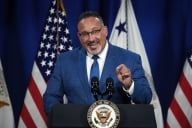You have /5 articles left.
Sign up for a free account or log in.
The University of Michigan blasted a Justice Department-backed free speech lawsuit against it Friday, calling it “a false caricature” of the institution’s rules on free expression.
Last month, a new watchdog group, Speech First, sued the university, alleging its policy definitions on “harassment” and “bias” were overly broad, unconstitutional and would chill free speech. The organization also criticized and called for the disbandment of the university’s Bias Response Team, a common tool at colleges and universities for helping handle incidents on campus that could be racist, sexist or otherwise prejudicial.
The Trump administration latched on to the lawsuit earlier this month, filing a “statement of interest” in federal court. The Justice Department agreed that the university’s policies could likely limit campus free speech. The department has also supported lawsuits that challenge “free speech zones” on college campuses, which generally are areas of campus where students are confined to protest or pass out literature.
Right after the Michigan lawsuit was filed, the university changed its definitions of “bullying” and “harassment,” which it said it had already intended to do.
But it defended the Bias Response Team in a court brief filed Friday, saying that the lawsuit mischaracterized its purpose. The team doesn’t have the authority to discipline students, nor investigate incidents on campus; it merely “provides support” to students when they want it, the university said. Never before have students been punished for bullying or harassment just for expressing their point of view, it said.
Speech First is representing three anonymous students who allege they have been shut down when they tried to discuss conservative views on controversial topics such as gun rights, immigration and abortion.
“There is no reason why those students or any others should not feel free to engage in such debate,” the university said in a statement. “The university’s policies explicitly guarantee them that freedom and do not threaten disciplinary action against any student for expressing any view, no matter how unpopular or controversial.”
The university noted in its court filings Friday that certain conservative-leaning groups on campus that espouse such views are affiliated with the institution and take advantage of university buildings for events. They have hosted conservative speakers, too, such as hot-button author Charles Murray and former Breitbart editor Milo Yiannopoulos.
“The actual intellectual life on campus includes student groups, student publications and outside speakers who are comfortable advocating and debating strongly held and sometimes controversial views across the full ideological spectrum,” the university wrote in its court filing.








